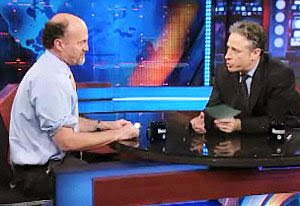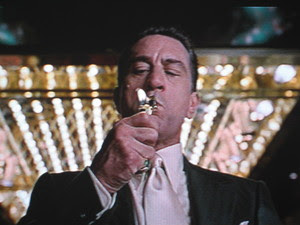
You gotta hand it to Jon Stewart - one week on after his bravura dressing-down of CNBC's 'Mad Money' analyst Jim Cramer, and the Internet is still buzzing about the need for old-school investigative journalism from our financial news organisations, lest they start looking obsolete. That a stand-up comic came to the rescue of the vocational descendants of Edward R Murrow is itself an indictment on the state of American journalism, to be sure. But hey, let's not sweat the small stuff. The big stuff is that the credibility of financial news organisations is being talked about in the Great Wide Open of the Internet and beyond, as it needs to be given the severe crisis we're finding ourselves in, and our need for crystal clear information from our financial news shows. Given the rapid advance of social media as an arena which can easily provide counterpoints to the clown shows in financial media, is it any wonder most of us are Twittering ourselves senseless to get real answers?
In (no) Financial Media Can We Trust?
As I watched Cramer give excellent squirm under Stewart's attacks ("Roll 210!"), I felt myself becoming enraged minute-to-minute, and it occurred to me only afterwards that part of my anger was in a question: does this mean that we now have to construct our own news because we can't trust journalists to do their jobs? Cramer actually spoke of CEOs lying to his face about the health of their companies, and Stewart was too right in calling him out as not having done his journalistic diligence on investigating whether the claims had merit. Surely the whole point of having financial experts coming to journalism is for the news to benefit from key expertise - so you can forgive them if they themselves aren't experienced in vetting stories as a trained reported would, but then that what junior reporter runts/researchers are there for.
So imagine my surprise when prepping this post I saw Cramer started his academic career as a journalist! Say what??? I was fully prepared to cut him some of the 'fin-expert' slack until that came across my desk. I actually felt some serious dread; if someone of his calibre and expertise in both worlds - finance and journalism - can't be trusted to produce a show with integrity and a keen eye for spotting the bugaboos which may trip up the layperson, then I don't get the point of the show's existence. (And remember, if you're a cable subscriber, you're actually paying for this nonsense!)
So how much of this is CNBC's fault? Can they actually be trusted to produce a financial news program that is more about news than it is about 'infotainment'? What does it say about the state of such programs that the best explanation of the current credit crisis is not some clip from a financial news show, but a video which started making the rounds last month from some expert individual who took it upon himself to explain the thing? As Stewart confronted Cramer with footage of him in 2006 advocating the practice of short-selling and rumour-mongering towards enhancing the position, I couldn't help thinking of CNBC's lack of investigative rigour and further wondered, is it because they can't? Is it because they're constrained in some way?
Where's Lowell Bergman When You Need Him?

The next morning as I was surfing for feedback on Stewart's show, I kept replaying Stewart highlighting the need for a financial news organisation whose role is to provide dispassionate news in the face of lying CEOs. Then, I remembered Michael Mann's superb account of how corporate entanglements can prevent information being given to the public in his 1999 movie, 'The Insider' (Al Pacino, Russell Crowe). In it, we're shown the story of tobacco scientist and whistleblower, Dr Jeffery Wigand, and his coming forth on Big Tobacco's efforts to boost nicotine addiction in cigarettes while claiming that they did not believe that such addiction existed, and how CBS News' '60 Minutes' had difficulties airing his story due to pressures from CBS Corporate, as the fallout from such a segment would potentially ruin a sale of CBS to Westinghouse back in 1995. "Is CBS Corporate telling CBS News, 'do not air this story'?" was the line from Al Pacino's Lowell Bergman that made me think, hey - can a big corporation like CNBC be trusted to even provide clean information if their corporate links to other companies prohibit such forthrightness?
That's what so great about social media - informational access without borders, confidentiality agreements, and byzantine relationships between corporate entities whose interests in the truth may vastly differ from ours. If more and more Cramers come onto the scene, with more and more corporate news behemoths not holding their feet to the fire with respect to journalistic integrity, then I too am with Stewart when he said, "I want the Cramer of Mad Money to protect me from the Cramer of that (hedge fund) video". So do we all, Jon, so do we all. Could social media be the answer here? Let's discuss!






